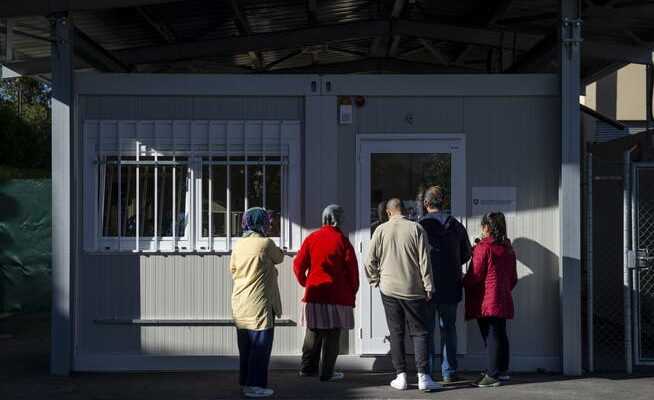Refugees from Afghanistan or Syria have had Muslim contact persons in the federal asylum centers for a year. The project is so successful that it is set to become a permanent solution.
Asylum seekers at the entrance to the Pasture Federal Temporary Asylum Center, on Thursday, October 8, 2020, in Balerna. The temporary accommodation at the Balerna site has 220 beds. The definitive federal asylum center with a procedural function in the municipalities of Balerna and Novazzano is scheduled to go into operation in 2023. (KEYSTONE/Ti Press/Francesca Agosta)
The State Secretariat for Migration (SEM) started a pilot project in January 2021, practically unnoticed by the public: Since then, four Muslim chaplains and one chaplain have been looking after the refugees in the federal asylum centers (BAZ) in the asylum regions of Zurich, Western Switzerland and Eastern Switzerland. The service should only have been offered until the end of last year on a trial basis, but on Monday the SEM announced an extension until at least the end of 2022. The aim is for Muslim pastoral care to become an integral part of the federal asylum centers.
The SEM relies on a study by the Swiss Center for Islam and Society (SZIG) at the University of Friborg: It rates the project as very successful. According to the head of the SZIG, Hansjörg Schmid, the feedback was mostly positive, both from the asylum seekers and from the BAZ employees and Christian pastors who have been active in the centers for a long time. The proportion of Muslims among the refugees in Switzerland is high, many come from Afghanistan or Syria.
Improved security situation
The asylum centers made negative headlines last year because there were repeated acts of violence, either between residents or between asylum seekers and the security staff. According to the SEM, however, the situation has calmed down considerably in the meantime – and the Muslim pastoral workers also contributed to this, explains Eric Kaser, head of the Integration department. “They were a piece of the puzzle in our efforts to improve the difficult security situation in the centers.”
In the evaluation, a BAZ employee says about the pastor who works there: “Well, he is really respected, above all I have the feeling that he is really accepted even by young, maybe a bit rebellious people, and he can deal with people very well , can de-escalate very well.” In this way, the pastor can also partially anticipate conflicts. But preventing violence is not the main task of the Muslim clergy, says Kaser. This function is mainly performed by experienced conflict prevention caregivers, of whom the SEM deploys 60 in the centres.
The recognition and prevention of radicalization tendencies among young Muslim men is not directly part of the duties of the pastor. “They are not detectives,” emphasizes SZIG boss Schmid. Nevertheless, the clergy would indirectly do valuable preventive work: “The refugees are often in a difficult personal situation and therefore possibly susceptible to radicalization. The ministers can channel religious questions and meet the demand for meaning.” In this context, the pastors are also valued as contacts for the BAZ staff. If a Muslim exhibits conspicuous spiritual behavior, prays very often and grows a beard, the religious experts can classify this.
Support in difficult life situations
The five pastors have interviewed asylum seekers from 19 countries, most of them in Arabic. According to the study, it was primarily about mental or psychosomatic complaints, fears about the future, disputes, family problems and emotional stress, with religious dimensions playing a role in many conversations. “They accompany refugees in difficult life situations and support them in overcoming conflicts and crisis situations.” They are linguistically, culturally and religiously close to the applicants and can thus contribute to stabilizing their living situation and creating a safe living environment in the BAZ.
From February, Muslim clerics will also be taking care of asylum seekers in Ticino and Central Switzerland. In addition, the SEM increases the workload of the past pastors. Because one finding of the evaluation was that the work hours are not sufficient to cover the demand for pastoral services. In addition, Schmid suggests creating more retreats in the BAZ for in-depth discussions and better communicating to the residents that the offer exists.
Until the end of the year, the SEM is looking for ways to secure long-term funding for Muslim pastoral care. If the project becomes a permanent institution, the question arises as to who should employ the clergy in the future. Various interviewees pointed out an asymmetry: unlike their Christian colleagues, the Muslim pastors are employed by the SEM and not by a religious community.
Funding by Muslims?
“Even if this did not have any short-term negative effects on the activities of the Muslim pastoral workers and their role, a long-term structural clarification is required at this point,” explains Schmid. A Christian pastor quoted in the report thought it would make more sense if the Muslim communities themselves offered pastoral care. This would dispel the suspicion that Islamic pastors should also take care of preventing radicalization.
The SEM had already carried out a pilot project with Muslim pastors in 2016 and 2017, but then canceled the exercise despite the positive feedback. At the time, the Muslim organizations had declared that they were not in a position to bear the costs of asylum counseling themselves.
